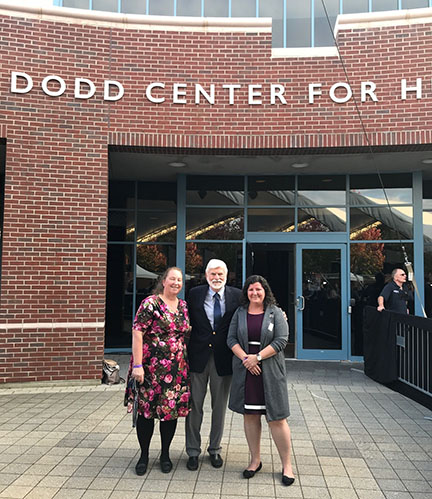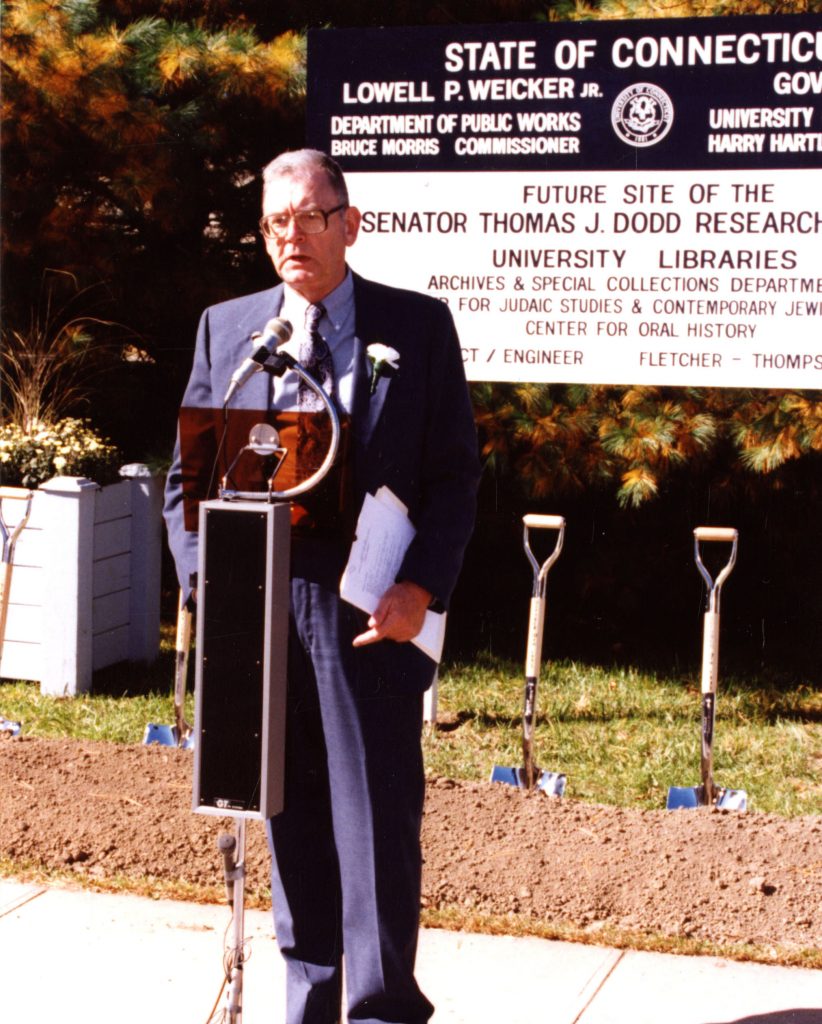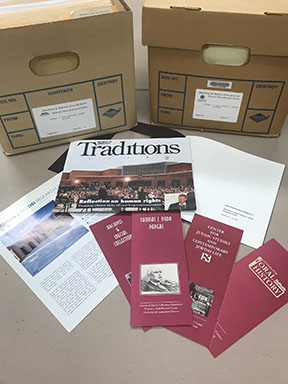“Imagine a near-perfect environment for the preservation of rare books and research collections. A place that welcomes the public with exhibitions, conferences, and lectures. A facility that encourages education, exploration, and scholarship. A place where knowledge is paramount and the past intertwines with the future.”

These are the words used in the campaign to build the Thomas J. Dodd Research Center, recently renamed the Dodd Center for Human Rights in a ceremony presided over by President Joe Biden. To better understand how we got here, we need to go back to the mid-1980s and two conversations that would ultimately converge. Within the History Department, emeritus faculty Thomas G. Paterson and Richard Brown, Board of Trustees Distinguished Professor of History, had initiated conversations with then-Senator Christopher J. Dodd around building an archive of Connecticut leaders. At the same time, the UConn Library had a vision – to build a facility to properly house UConn’s archives and special collections, an initiative led by former Library directors John P. McDonald and Norman D. Stevens, Rand Jimerson, and Head of Special Collections Richard H. Schimmelpfeng. The converging of these conversations, and the appeal to the Dodd family’s life-long interest in serving the people of Connecticut, was the perfect storm that was given a seal of approval from UConn President John Casteen.

Groundbreaking on the state-of-the-art facility began in 1993 under the leadership of then UConn President Harry Hartley. Purpose-built for the management of archival and special collections, the building provided a technologically advanced, secure, climate-controlled environment for storing collections, and a stunning place for research and engagement, the John P. McDonald Reading Room. In addition, the goal was to create a space where people could gather around this wealth of scholarship, to continue to learn and grow from each other’s perspectives. As a result, part of the 55,000 square foot space housed two important and connected UConn programs – the Center for Judaic Studies & Contemporary Jewish Life, and the Center for Oral History. It also provided a physical location for scholars, students, and the public to connect via exhibitions, events, and programs via the Doris & Simon Konover Auditorium, a public lounge, gallery, and conference rooms.

These “layers,” as they were initially called when describing the physical building, would also be used to define a new form of collaborative scholarship. Together, Archives & Special Collections, the Center for Oral History, and the Center for Judaic Studies & Contemporary Jewish Life worked towards collaborative programming, research, and learning initiatives, as well as toward their unique goals, building programs and collections to benefit the University and beyond. This began with the celebration known as The Dodd Human Rights Year, with programming across campus culminating in the dedication of the Thomas J. Dodd Research Center by President Bill Clinton on October 15, 1995.
“I am confident my father would be proud to know his works – as well as the original manuscripts and works of other great politicians, writers, educators, environmentalists, and artists – will be housed in a state-of-the-art facility at the University of Connecticut devoted to their scholarly exploration and physical preservation.” – Senator Christopher J. Dodd
By 2003, the Human Rights Institute was established in the Dodd Center to coordinate human rights academics across the University. Management of the Dodd Center and its programming initiatives remained under the care of the UConn Library and Archives & Special Collections until 2011, when archives and special collections and the Center’s programming were restructured. Today, the Dodd Center for Human Rights houses three independent programs – the UConn Library’s Archives & Special Collections, the Human Rights Institute and its outreach initiative, Dodd Impact, and the Center for Judaic Studies & Contemporary Jewish Life – and continues to provide a technologically-advanced environment for the care and management of critical research collections and a collaborative space for building connection and engagement with the campus community and the broader public.
Each of these programs carries on the legacy of the Center’s founding, inspiring engagement with the past and carrying its lessons into the future, and creating new opportunities for connection, learning, and understanding. Archives & Special Collections is proud to build on this history, developing rich collections that connect past, present, and future, and supporting the scholarly and creative achievements of our global community of scholars through innovative services and meaningful programming. Learn more about our work at https://lib.uconn.edu/location/asc/
